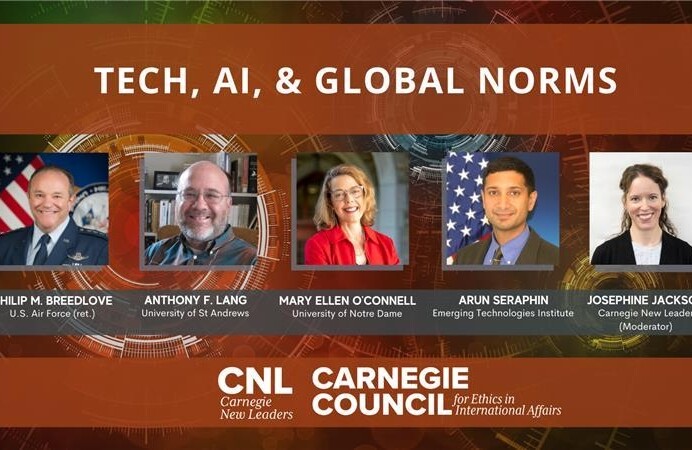Framing ethical perspectives
Multilateralism refers to a group of nations working together for a common goal. It is at the heart of international relations as nation-states form alliances with like-minded countries to take on global issues, such as climate, emerging technology, inequality, and collective security. Carnegie Council sees multilateralism as essential to generating solutions to global problems and a critical component of an ethical present and future.
Featured Multilateralism Resources
Inclusivity, AI & climate governance, and more
FEB 27, 2024 • Video
A Carnegie Council Conversation with the UK Home Secretary
MAR 28, 2024 • Video
Unlocking Cooperation: The Global South and Global North
In the inaugural panel of the "Unlocking Cooperation" series, Ramu Damodaran leads a discussion on forging a path forward for Global South/North collaboration.
OCT 18, 2023 • Video
Unlocking Cooperation: A Global Ethics Day Special Event
In this keynote event for Global Ethics Day 2023, Carnegie Council President Joel Rosenthal led a conversation on the psychology behind cooperation; ways that states, institutions, ...
Subscribe to the Carnegie Ethics Newsletter for more on ethics and international affairs
Related Initiatives
Model International Mobility Convention
The primary goal of the Model International Mobility Convention (MIMC) is to formulate new rules for migration and asylum that can benefit both migrants and refugees as well as their states of origin, transit, and destination.
Carnegie Ethics Accelerator
The Carnegie Ethics Accelerator is a new kind of incubator designed to empower ethics in the face of swiftly evolving challenges in technology and public policies.
Explore Our Multilateralism Resources

APR 20, 2022 • Podcast
The Doorstep: Defining the Role of the U.S. on the Global Stage
Global war, inflation, and a COVID-19 resurgence—the Biden/Harris team has been put on defense for first two quarters of 2022. This week, "Doorstep" co-hosts ...

APR 19, 2022 • Podcast
Why Democracy vs. Autocracy Misses the Point, with Jean-Marie Guéhenno
Senior Fellow Anja Kapsersen is joined by Professor Jean-Marie Guéhenno for a conversation about virtual communities and the advent of the age of data.

APR 8, 2022 • Article
A New Consensus for a New Era?
As we await the release of the National Security Strategy of the Biden/Harris administration, Senior Fellow Nikolas Gvosdvev shares an assessment of the birth ...

APR 7, 2022 • Podcast
The Doorstep: Pakistan & the Populist World Order, with Atlantic Council's Uzair Younus
A leader asking his second in command to keep him in power. A parliament dissolved. A Supreme Court deciding the fate of a nation. Echoes ...

MAR 24, 2022 • Podcast
The Doorstep: How Cryptocurrencies & NFTs May Change the Global World Order, with David Yermack
NYU Stern's Professor David Yermack discusses NFTs, Ukraine, and the future of crypto with Carnegie Council Senior Fellows Nick Gvosdev and Tatiana Serafin.

MAR 23, 2022 • Podcast
Tech, AI, & Global Norms
How do tech, AI, and global norms intersect to generate political, legal, and ethical dilemmas? In this event, Carnegie New Leader Josephine Jackson leads a ...

MAR 18, 2022 • Podcast
Red Carpet: Hollywood, China, and the Global Battle for Cultural Supremacy, with Erich Schwartzel
Hollywood has long been part of the United States' soft power arsenal. Now, that soft power is threatened by the larger geostrategic competition between the ...

MAR 15, 2022 • Podcast
The Strategy of Denial: American Defense in an Age of Great Power Conflict, with Elbridge Colby
In this wide-ranging talk, U.S. defense expert Elbridge Colby discusses the changing nature of American power with Carnegie Council President Joel Rosenthal. As the ...

MAR 10, 2022 • Podcast
The Doorstep: Is the U.S. Already at War? with Politico's Nahal Toosi
As we enter week three of Russia's invasion of Ukraine, Nahal Toosi, senior foreign affairs correspondent for "Politico," joins "Doorstep" co-hosts Nick Gvosdev and Tatiana ...

MAR 2, 2022 • Podcast
The Doorstep: Can Putin Be Stopped? with Atlantic Council's Melinda Haring
Atlantic Council's Ukraine expert Melinda Haring joins "Doorstep" co-hosts Nick Gvosdev and Tatiana Serafin to discuss where we are one week after Russian President Vladimir ...




